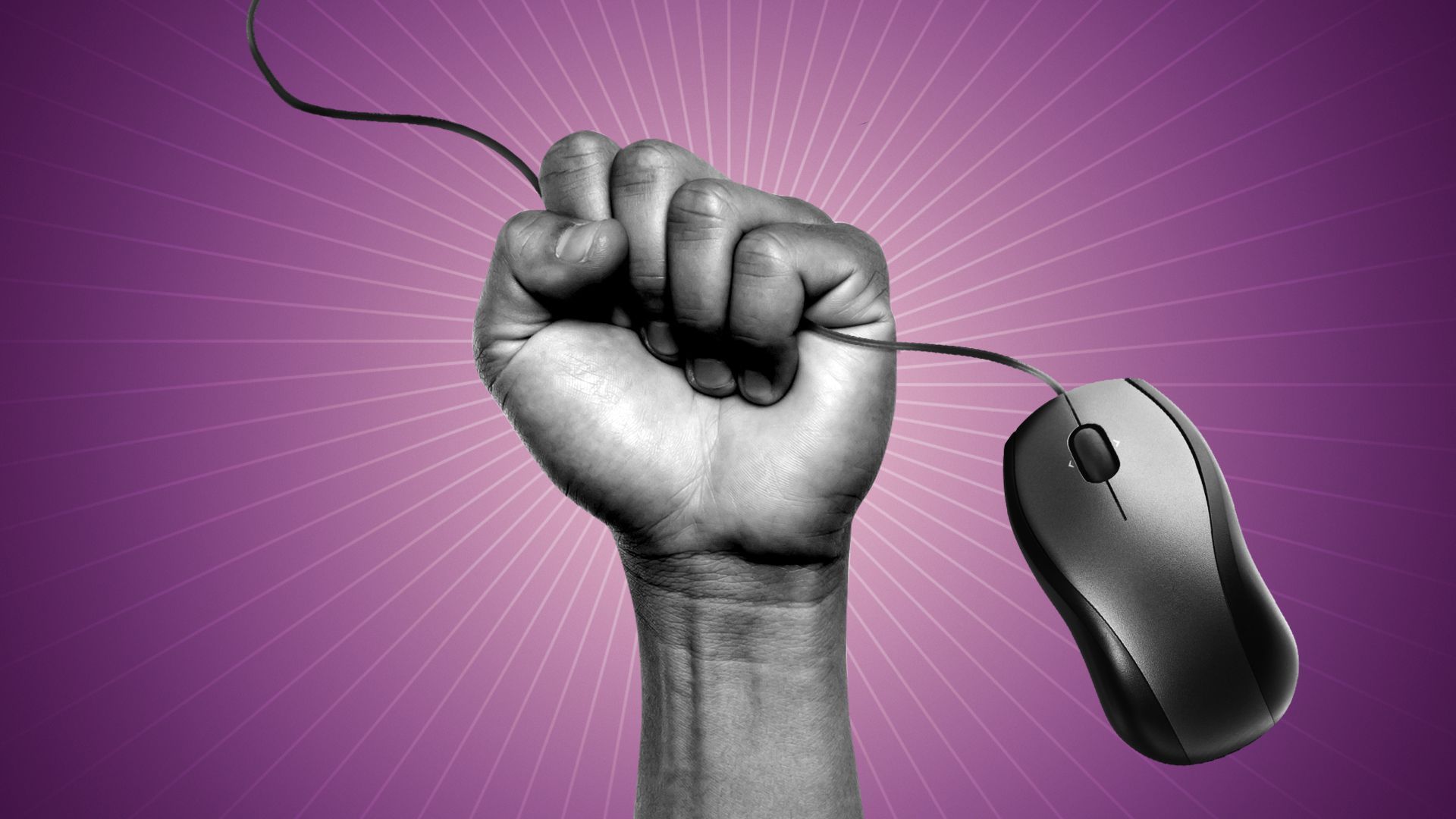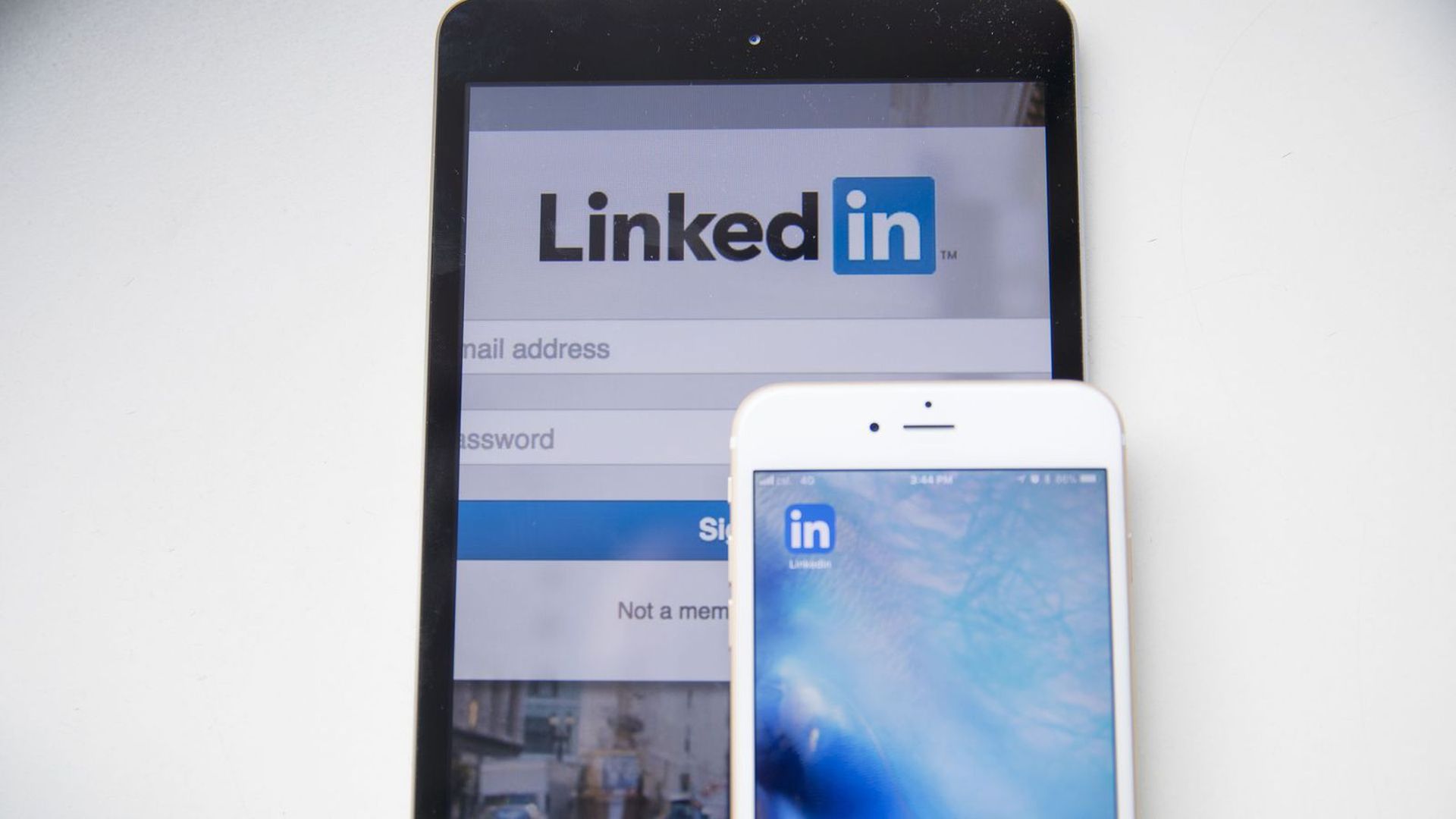October 15, 2021
Join Axios' Margaret Talev and Bryan Walsh today at 12:30pm ET for a virtual event on how advanced technologies are transforming defense sector strategies. Guests include Sen. Mark Kelly (D-Ariz.) and Palantir Technologies global defense lead Doug Philippone.
Today's newsletter is 1,139 words, a 4-minute read.
1 big thing: Congress vs. "the algorithm"

Illustration: Aïda Amer/Axios
The outcry over Congress' latest proposal to regulate tech companies' algorithms shows how difficult it is for lawmakers and platforms alike to deal with online content moderation, Axios' Margaret Harding McGill reports.
Why it matters: The new bill is backed by the leadership of a powerful committee with jurisdiction over the issue, giving it more momentum than some previous legislative attempts to revamp online platforms' legal protections.
What's happening: Scholars, organizations backed by tech companies, and a digital rights group weighed in Thursday to oppose the Justice Against Malicious Algorithms Act, sponsored by House Energy & Commerce Committee Chairman Frank Pallone (D-N.J.).
- "This bill is well-intentioned, but it's a total mess," Fight for the Future director Evan Greer said.
How it works: The bill would modify Section 230 of the Communications Decency Act, which protects websites from liability over content posted by their users.
- Under the bill, an online platform would lose protection under Section 230 if it knowingly or recklessly uses a personalized algorithm to recommend content that materially contributes to physical or severe emotional injury.
The fine print: The bill does not apply to search features or algorithms that don't rely on personal information.
- It also doesn't apply to internet infrastructure services, such as web hosting, or to online platforms with less than 5 million unique monthly visitors or users.
What they're saying: The bill, backed by Democratic leaders in the committee, is meant to hold platforms accountable for recommending content that leads to real-world harms.
- "When you've got platforms that have recommended accounts to teenagers that actually encourage eating disorders, that harm their mental health, I think ordinary Americans say, 'Time is up,'" Rep. Jan Schakowsky (D-Ill.), chairwoman of the House Energy & Commerce consumer protection subcommittee, told Axios.
Yes, but: Critics say the bill would have unintended consequences as well — and likely wouldn't even achieve its stated goal.
- The bill "wouldn’t prevent platforms from using algorithms to pick and choose what users see," Greer said. "It would just incentivize those platforms to show users more 'sanitized,' corporate content that has been vetted by lawyers as non-controversial."
- K. Dane Snowden, president of tech industry trade group the Internet Association, said the bill would undermine the work social media companies are doing to address content moderation problems.
- Mary Anne Franks, a professor at the University of Miami School of Law, said companies "could and probably would simply rely more on group-targeted algorithms to recommend content.”
The other side: The bill could incentivize larger platforms to try to avoid amplification that causes harm, Karen Kornbluh, director of the Digital Innovation and Democracy Initiative at the German Marshall Fund, told Axios.
- Roddy Lindsay, a former Facebook data scientist who has called for changes to Section 230, supports the legislation because he thinks it will force companies to give users more control over their online experience.
2. Black tech workers' trust gap with employers

Illustration: Shoshana Gordon/Axios
Only 52% of Black tech employees say they trust that their employers value inclusion and diversity, according to a new survey by /dev/color, a non-profit focused on Black technologists, Axios' Kia Kokalitcheva reports.
- 85% say they'd switch to another employer "that valued me as a Black employee more authentically."
Why it matters: While much of the discussion around diversifying the tech industry's ranks revolves around hiring, the experience of employees from underrepresented backgrounds once they are within companies is just as important.
What they're saying: "This isn't just about broken promises or missteps that happen all the time, but failing to walk the walk, failure to deliver," /dev/color CEO Rhonda Allen tells Axios.
By the numbers, per /dev/color's survey of 260 of its members, conducted in Q1 2021:
- 62% said they felt appreciated by their employer as a Black engineer or Black leader.
- 90% said their employer needs to invest more in growing its Black employee pipeline.
- 50% said the consequences of speaking out were too risky for their career.
The bottom line: "It's less about saying this is how people feel, it's more about saying 'this is a real threat to the future of your business, to the innovation that you're trying to foster, to the culture you’re trying to build,'" says Allen.
3. LinkedIn to shutter service in China

Photo: studioEAST/Getty Images
LinkedIn on Thursday said it will sunset the localized version of its service in China and will instead launch a new job boards app called "InJobs" later this year, Axios' Sara Fischer reports.
Why it matters: In a statement, the company said it's making these changes because it's facing "a significantly more challenging operating environment and greater compliance requirements in China."
Catch up quick: The news comes two weeks after Axios China reporter Bethany Allen-Ebrahimian reported that LinkedIn blocked the profiles of several U.S. journalists from the company's China-based platform, citing "prohibited content."
- Allen-Ebrahimian posed questions to the tech giant about the ordeal.
- Chinese authorities punished LinkedIn for lax censorship earlier this year before the company blocked journalists and researchers in the region.
Details: In the statement, LinkedIn said its new strategy for China is to put its focus "on helping China-based professionals find jobs in China and Chinese companies find quality candidates."
- The company says later this year it will launch a new jobs application app called "InJobs" in China that will not include a social feed or the ability to share posts or articles.
Go deeper: LinkedIn blocks U.S. journalists' profiles in China
4. New reports on Amazon's rivalry with merchants
Two reports this week are providing new ammunition for critics who say Amazon doesn't play fair when it comes to competing with third-party merchants who sell on its site.
Why it matters: In both cases, Amazon is accused of using aggressive tactics to create products that mimic popular items on its site and then tweaking its rankings to favor the Amazon-made offerings — both issues that have already been raised as potential antitrust concerns.
Driving the news:
- The Markup reported on Wednesday an investigation that showed examples of Amazon placing its own products — and those of companies that sell exclusively on Amazon — above those from other third party merchants, including those that appear to have stronger sales and better reviews.
- Earlier this week, Reuters published a special report finding that in India, Amazon systematically created copycat versions of popular products and then ranked the homegrown versions ahead of the popular products they were designed to compete with.
5. Take note
On Tap
- I'm moderating a discussion with finance industry pioneer Sallie Krawcheck at the Female Founders Alliance Leadership Summit.
ICYMI
- HTC unveiled the Vive Flow, a $499 VR headset aimed at consumers. (Protocol)
- Taiwan Semiconductor Manufacturing Co. plans to build a chip plant in Japan, its first such facility there. (Reuters)
- The Washington Post has a profile of Cher Scarlett, an Apple employee who has led the #Appletoo movement highlighting various forms of alleged harassment at the company. (Washington Post)
6. After you Login
Where you start isn't always where you end up, as this truly incredible artwork shows.